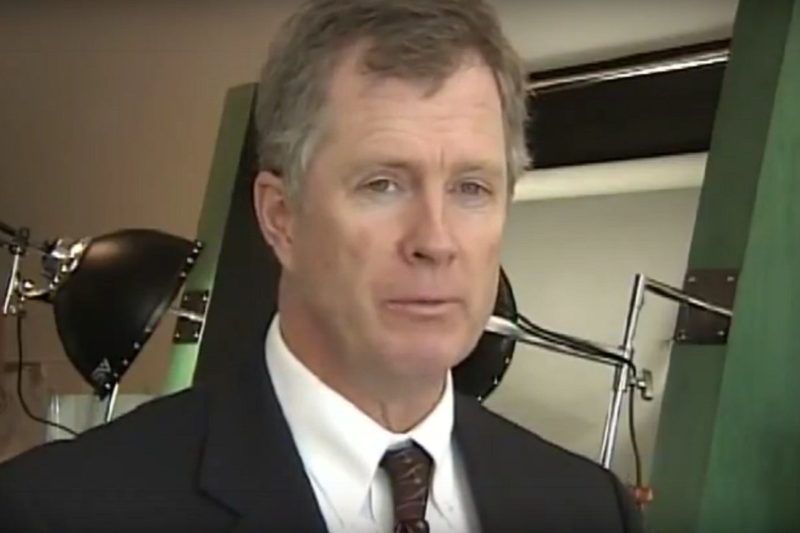Will Kansas Democrats Choose an Anti-Choice Candidate to Vie for Open Congressional Seat?
Five Democrats are vying for their party’s nomination to fill the congressional vacancy left by Mike Pompeo, the new director of the Central Intelligence Agency and former GOP representative for the 4th Congressional District. One of them is deeply anti-choice.

The Democratic candidate for an open congressional seat in Kansas could be a favorite of the state’s anti-choice activists.
Five Democrats are vying for their party’s nomination to fill the congressional vacancy left by Mike Pompeo, the new director of the Central Intelligence Agency and former Republican representative for the 4th Congressional District, which covers most of south-central Kansas. The Democratic nominee will be chosen by a committee of party activists at a February 11 convention, and a special election to choose the representative will take place on April 11.
One Democratic candidate is former state treasurer Dennis McKinney, who has a long anti-choice record at odds with the official platform of the Kansas Democratic Party. McKinney served 16 years in the Kansas House, where he voted in favor of increased restrictions on abortion care, including a measure that defines a fetus as a person in cases of criminal violence. Such “personhood” measures have been roundly rejected by voters across the country.
McKinney in 2010 received an endorsement from the state’s leading anti-choice group, Kansans For Life, when he sought re-election for state treasurer.
The other four candidates, Laura Lombard, Robert Tillman, James Thompson, and Charlie Walker, are pro-choice.
“The stakes are too high to send someone like McKinney to Washington,” Laura McQuade, president and CEO of Planned Parenthood Great Plains Votes, said in an email. “The Kansas Democratic Party’s platform clearly supports sexual and reproductive health and rights, including access to abortion, and its candidates should … too.”
McKinney’s anti-choice stance isn’t wholly unusual in Kansas, where the legislature is controlled by lawmakers who have long attacked reproductive freedoms, having added 30 laws eroding abortion access since 2010. However, with anti-choice momentum building in Congress and the recent introduction of a federal “heartbeat bill” that amounts to a total abortion ban, the election of an anti-choice Democrat to the U.S. House of Representatives could have lasting effects on national policy.
The phenomenon of anti-choice Democrats in Kansas is hardly new. When Pompeo was re-elected in 2016, his Democratic opponent, Dan Giroux, also opposed abortion rights. Had it not been for independent candidate Miranda Allen, voters in the 4th Congressional District would have had no pro-choice candidate on the ballot. Former Kansas Secretary of Agriculture Josh Svaty, who was a Kansas House Democrat from 2003 to 2009, had an anti-choice voting record as well. He recently expressed interest in running for the Democratic gubernatorial nomination in 2018.
In a state where Sen. Bernie Sanders (I-VT) won 68 percent of the Democratic caucus vote in record voter turnout, some politicians continue to uphold the narrative that candidates must oppose abortion to win in Kansas. Thirty percent of Kansans believe abortion care should be illegal, according to a survey conducted last year by Public Policy Polling. Almost four in ten survey respondents said “they may not choose abortion for themselves or their families but the government should not prevent a woman from making that decision herself.”
“For the one in three women who will have an abortion, and the majority of Kansans who believe abortion should be safe and legal, supporting sexual and reproductive health care is not a bargaining chip,” McQuade said.
The state’s lingering financial woes and budget shortfall have dominated election issues in recent years, but anti-choice candidates in Kansas often make attacks on abortion access a central campaign issue. The blockage of some anti-choice legislation by the Kansas Supreme Court is one reason the retention of supreme and appellate court justices in 2016 became a contentious issue, resulting in radio and television ads across the state.
Sexual and reproductive health care “is just as much a priority as restoring the budget and school finance,” McQuade said. “We need a representative in Washington who will speak and act on behalf of the majority of Kansans.”
The Kansas Democratic Party officially added a person’s right to choose to its platform in 2014.
“The current Democratic Party platform is one of the most progressive platforms we’ve had in Kansas,” said Julie A. Burkhart, founder and CEO of the Trust Women Foundation, a pro-choice and reproductive rights nonprofit based in Wichita, Kansas. Trust Women opens clinics that provide abortion care in underserved communities and operates two clinics—one in Wichita and the other in Oklahoma City.
“What’s important is educating people on matters of reproductive rights so that they feel empowered to run and not shy away from the issue,” Burkhart said. Not every candidate, she added, will embrace all aspects of the platform. “The party does not always control who is running.”
Officials from the Kansas Democratic Party declined to comment for this story.

